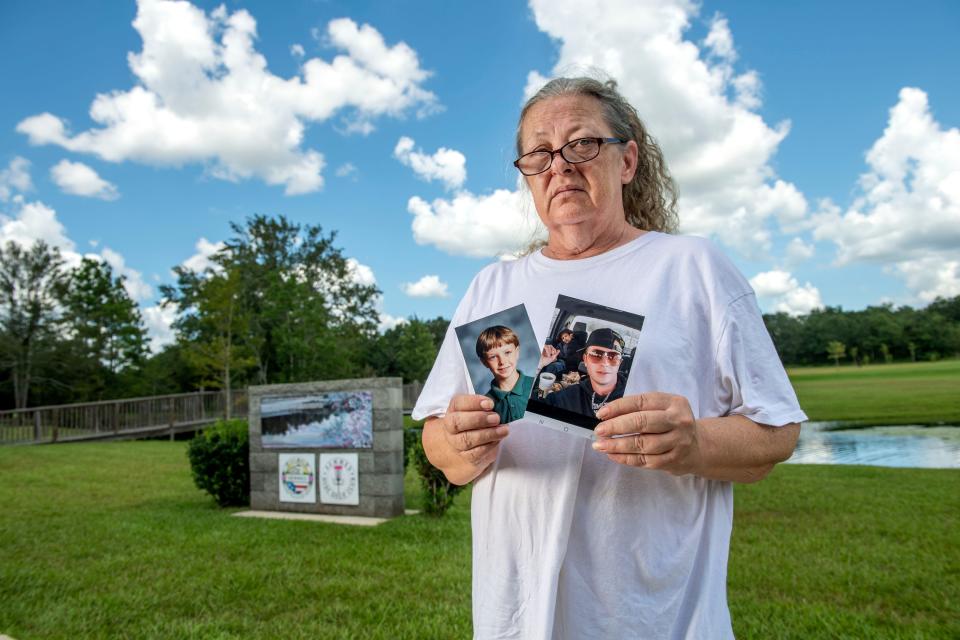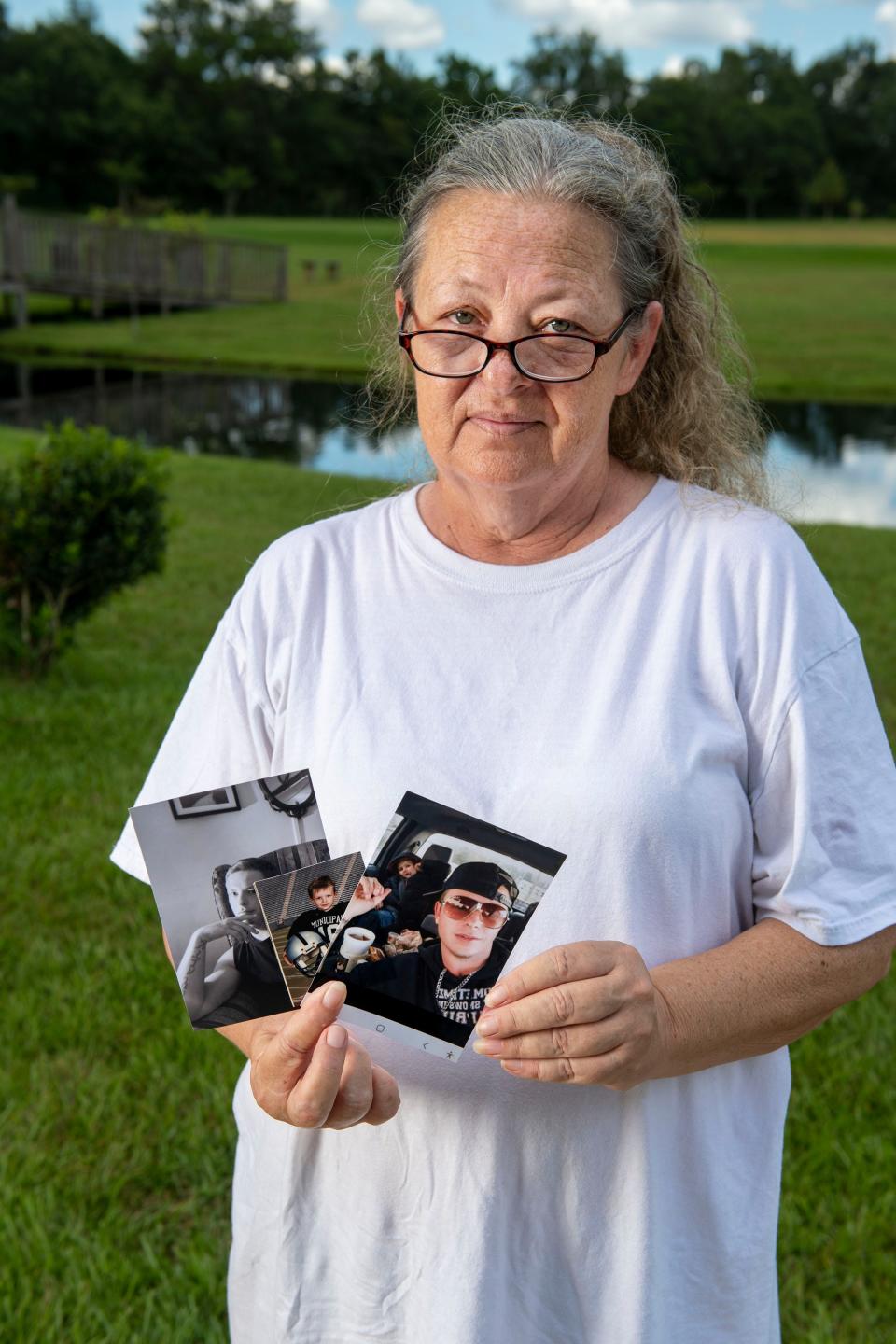Man begged for mental health care, told guards he was suicidal before his death

- Oops!Something went wrong.Please try again later.
Chadrick Wade begged for help. The fire he'd lit outside his cell finally got the guards' attention.
“He told them he needed mental health,” his mother, Sarah Burch, said.
They threatened to spray him with chemicals if he did it again.
Another guard took Wade out of his cell, handcuffed him and led him to a prison lobby. He sat alone for a while. When the guard came back, Wade told him he felt suicidal.
“He wanted to go to the infirmary," Burch said. “He just couldn’t take no more."
Wade was not treated, and the guard took him back to the same cell he was in before.
Other inmates told Burch that, as the guard walked away, Wade warned him what he was going to do.
“If y’all aren’t going to f*****g help me,” he said, “I can get some fentanyl. I won’t feel a f*****g thing.”
A week later, on July 4, 2022, Wade was found unresponsive in his cell at Fountain Correctional Facility. Another inmate ran him to the prison infirmary, but life-saving measures failed. He was 30.
Although his autopsy is not yet complete and prison officials have offered little information regarding his death, another inmate whose cell was close by says Wade died by suicide from an overdose.
“I can only believe that if he made that statement … then shortly after, he overdoses, that he intended to do what he did,” said Shaun Traywick, who was housed near Wade in Fountain prison.
The Alabama Department of Corrections declined to comment for this story, citing an ongoing investigation into Wade's death by the ADOC Law Enforcement Services Division.
Wade's experience in prison shows in detail what can happen when the horrors of prison are combined with an abundance of attainable illegal drugs and a failure to provide adequate mental health care.
Burch wishes somebody — even she — had done something to help her son before he died.
“They should have listened to him when he was sitting there burning his clothes,” Burch said. “They knew that that was a cry for help. They knew to safeguard him and watch him. They could’ve done a million things differently.”
'A good boy'

Born in 1992, Chadrick Wade — Burch calls him Chad — was always the goofiest of his siblings. He was the baby of the family, and Burch hardly had to discipline him.
“He was the only kid I ever got who never had a single whupping his entire life,” she said. “He just never needed it.”
As he grew up, his talents started to blossom. He made drawings of Yu-Gi-Oh characters that his elementary school classmates liked enough to pay for. He brought home as much as $40 some days before his teacher made him stop selling his art, Burch said.
“He excelled at everything he did with little to no effort,” Burch said.
He loved to hang out with his siblings, too. His brother, Timothy, tried to teach him about the Bible, Burch said.
“[Chad] worshipped Timothy,” Burch said. “They all did. Timothy was their right hand.”
Once he turned 13, Wade started working with his father, Paul Burch, at Coastal Stucco. The money he earned went to things most teenage boys might buy: new shoes, clothes, a weight bench for working out.
But he always gave money away more easily than he spent it, Burch said. One Christmas, he got the nearly $700 television he’d been asking for. But when the needy family that was staying with them for the holidays came by, he gave it away.
“He wanted things,” she said. “But he didn’t want to keep you from having things when you didn't have the advantages that he had.”
A bad habit
Wade's first his encounter with drugs, as far as Burch knew, was with synthetic cannabinoids (or synthetic marijuana), an unregulated, dangerous type of designer drug sold under brand names like Spice and K2. Wade and his buddies bought the drugs from gas stations or corner stores.
One night when he was 16, Wade made it into Club Atlantis, where his sister worked. Sometime during the evening, he took a drug that had a nasty effect on him, and he was arrested for the first time. He was charged with underage drinking, Burch said, and spent the night in the Mobile County Metro Jail.
Later that year, Burch sent Wade to live with her parents as she was fighting cancer. Burch’s younger sister and brother-in-law, who both struggled with drug addiction, moved into the house about the same time Wade arrived.
The couple was cooking crystal meth.
“The first dose of meth that Wade ever took, she gave it to him,” Burch said. The only other drugs he had done before that were the synthetic cannabinoids he smoked a few times.
“After that, school went to hell.”
Wade dropped out not long after.
When he moved back to Mobile, he again worked for Coastal Stucco. He went through a bad breakup, Burch said, and his drug use escalated. He was hooked on opiates.
First prison stint, rehab and relapse
In November 2016, Wade was arrested and charged with burglary. Prosecutors said he had a gun on him when he entered the Semmes, Alabama, home he and a pair of accomplices burglarized. He pleaded guilty in May 2018 and was sentenced to three years in prison to be followed by 12 years of probation, court records show.
He started his sentence at Easterling Correctional Facility, where he completed a six-month substance abuse program and was transferred to the Elba Community Work Release Center. Shortly after, he was back home. Wade’s probation began on November 18, 2019.
But three months later, Mobile police officers caught him with crystal meth. They arrested him and held him at the jail until Nov. 19, 2020, when he was transported to a Teen Challenge rehabilitation center for a one-year inpatient treatment program.
Still, trouble followed him. Less than two months into the program, he robbed a convenience store in Selma. Wade stole a bottle of Tianaa, an opioid-like synthetic drug sold in many gas stations, court records say.
He got kicked out of the rehabilitation program, and this time, he had nowhere to go.
It was late January 2021, at the height of the pandemic. Burch said several members of the family were afraid Chad might spread COVID-19 to immunocompromised members of the household, so he lived in the woods behind a Chevron gas station and did tattoos for people when he could to try to get by.
On March 6, 2021, he was arrested and charged with third-degree robbery in a bizarre incident in which prosecutors alleged he threw a woman out of her car and drove off with it. The charge wasn’t pursued in court.
His probation was revoked on May 6, 2021, and he was sent to Fountain Correctional Facility. At the time, Burch thought he’d be safer in the prison than on the street.
A failing prison system

Fountain is a medium-security prison in Atmore, Alabama, just two miles away from Holman Correctional Facility, the holding place for Alabama’s 165 death row inmates.
Like nearly all Alabama prisons, Fountain is overcrowded and understaffed. Most recent data from the Alabama Department of Corrections show that 1,243 men are incarcerated at Fountain, which was designed to house only 831.
To handle the bloated inmate population, Fountain employed only 72.5 correctional officers as of December 2021, based on ADOC court filings. It had 121.5 vacancies at the same time.
Sarah Light, staff attorney at the Southern Poverty Law Center, said it’s hard to get people to work in the prisons, especially when pay is typically under $35,000 a year.
“I think working at Target making $15 an hour … is a lot more appealing to people than going in a facility where they've had multiple people stabbed in the last month,” she said.
The resulting violence throughout the prison system is summed up by the Justice Department in its 2020 lawsuit against the State of Alabama and the ADOC: Alabama “fails to provide adequate protection from prisoner-on-prisoner violence and prisoner-on-prisoner sexual abuse, fails to provide safe and sanitary conditions, and subjects prisoners to excessive force at the hands of prison staff.”
2022 has been a deadly year, so far, at Fountain. Eleven men incarcerated at the prison died in the first eight months of fiscal year 2022; four men attempted suicide during the same time period, according to ADOC’s most recent monthly report.
Drug use in prisons
Drugs are ubiquitous in the prisons. Traywick called drugs "an easy access" for incarcerated Alabamians.
Drugs arrive in several different ways, per a 2019 DOJ investigation: through staff, visitors, prisoners returning from other locations and bags thrown over prison fences. But prisonstaff, although they are supposed to be screened for contraband when showing up for work, according to ADOC spokesperson Kelly Betts, may be the primary culprit.
"An I&I investigator interviewed at ADOC headquarters, whose job includes investigating staff corruption, stated that, 'without a doubt' the number one way contraband is getting into prisons is 'by staff smuggling it in.' A former ADOC warden told us the same thing," the DOJ wrote.
At some prisons, guards estimate that the majority of inmates use drugs. In the DOJ report, a shift commander at Holman estimated that an appalling "95% of the facility's prisoners were using drugs."
Traywick said he thinks instead of focusing on how drugs enter the prisons, people should ask why those inside the prisons feel the need to use them.
"The answer to that is there’s no hope, there’s no incentives, there’s no nothing for them to want to do better," he said.
In a conversation with the Advertiser in July, Traywick compared living in prison to living in a coffin.
"You're existing in a coffin and no one cares to dig you out," he said. "You're existing at this point just to die."
‘A dark side’
Wade was placed in general population at Fountain in May 2021. He talked with his mom frequently, sometimes making several calls a day from a cellphone another inmate had. He became friends with a few other men at the prison, doing tattoos with a tattoo gun he made. He was generally pretty laid-back and quiet.
Then Timothy died. Burch remembers breaking the news to Wade.
“Not Tim,” he said. “He couldn’t believe it. [Timothy] was the sweetest thing.”
Based on what Burch heard from the inmate who loaned him his cellphone from time to time, Wade started to distance himself around this time to hide his increased drug use.
“He was ashamed of himself,” Burch said.
He may have also amassed debts from his drug use, which, combined with the horrors he witnessed and experienced, took a toll on his mental health, said Traywick, who is a co-founder of Unheard Voices O.T.C.J., a grassroots organization aimed at reforming the prison system.
In 2019, the DOJ wrote that "the inability to pay drug debts has led to beatings, stabbings, and homicides," in Alabama's prisons.
Chad also told Burch about several sexual assaults he saw in prison, including a particularly violent rape. Once, he slept on the ground, only to wake up with his face in a puddle of another man’s urine.
“Chad went through hell,” Traywick said.
Burch said she felt like a “dark side” she’d never seen had come over her son.
“You could see fear in his heart,” Traywick said.
Prison staff moved Wade to a one-man cell in restricted housing after he requested it. There, he was no longer laid-back and quiet. He banged on the bars of his cell and pleaded for mental health care.
His drug use also became increasingly dangerous. Traywick said he overdosed one day but was revived in the prison infirmary. Burch said one of Wade’s other fellow inmates told her after his death that he had overdosed several other times.
Wade was placed back in segregation a few days later. Video taken on June 27 by a man in the same cell block as Wade shows a piece of fabric burning outside his cell.
“Trying to get medical attention,” the man who recorded the video says.
A guard walks over slowly, dumps water on the fire and then walks away. In another video, two guards stand outside the cell talking, and one waves his arms in exasperation.
Mental health staffing issues
Court documents from an ongoing lawsuit from 2014 expose severe deficiencies in mental health care in Fountain and throughout the ADOC. Plaintiffs in Braggs, et al. v. Dunn, et al. allege that ADOC “systemically puts the health and lives of prisoners at risk by ignoring their medical and mental health needs and discriminating against prisoners with disabilities.”
In the eight years since that lawsuit was filed, the U.S. District Court for the Middle District of Alabama has issued damning opinions of ADOC practices and ordered the department to improve staffing levels and access to mental health care for prisoners.
In 2021, District Judge Myron Thompson said ADOC’s understaffing undermines its ability to treat inmates’ mental health needs in “numerous, insidious ways.”
“Prisoners do not receive adequate treatment and out-of-cell time because of insufficient security staff to supervise these activities,” Thompson wrote. “They decompensate, unmonitored, in restrictive housing units, and they are left to fend for themselves in the culture of violence, easy access to drugs, and extortion that has taken root in ADOC facilities in the absence of an adequate security presence.”
Consequently, the “sky-high” suicide rate keeps the paltry mental-health staff managing crises rather than treating patients, Thompson said.
The department has been ordered to hire more correctional and medical staff, but progress has been fatally slow.
“These steps cannot wait,” Thompson wrote in 2021. “So long as ADOC’s current staffing levels persist, people with serious mental-health needs are not safe in Alabama’s prisons, but are at daily serious risk of deprivation, decompensation, and death.”
Fountain employs only one part-time psychiatrist, and its staffing of mental health clerks, nurse practitioners and mental health professionals falls below court-instructed levels, based on a quarterly staffing report filed in the Bragg lawsuit in June. From January to March 2022, Fountain employed no mental health nurses.
If ADOC reaches adequate staffing, it’ll probably be a long time from now.
“ADOC is on track to achieve sufficient staffing to safely conduct normal operations sometime in mid-2037,” Thompson wrote in a December 2021 opinion based on expert determinations.
To make matters worse, staff at Fountain has made a habit of ignoring inmates' pleas for help, Traywick said. Many men say they are suicidal, but staff take very few of those comments seriously.
"But the thing about it is DOC has a duty," he said. "It doesn’t matter if you yourself as a DOC official feel like they’re not serious. That’s not up to you.”
Grief, guilt and hope

Burch said she still can’t square the last conversation she had with her son. He sounded happier than he had in weeks.
It was the Fourth of July and Wade said he was walking around the prison yard with his shoes off. When he asked her for $20, she didn’t want to ruin his good mood. She thought he was going to buy some food with it, and she just wanted to make him happy.
She heard him tell someone that he had $20 coming, but she didn’t think much of it.
When she hung up, she went back to enjoying her family barbecue.
Six hours later, she got the warden’s phone call informing her of Wade's death.
Burch believes that her son used the $20 she sent him to purchase the drugs that he may have overdosed on. And at times, her grief — and the weight of her guilt— is unbearable.
“Somedays it’s OK, somedays I ain’t gonna make it,” she said through tears. “I’m just trying to make sense out of it.”
She’s reached out to lawyers across the country to help bring justice for her son, but none will represent her, she said. But she still has hope. She still believes that the system that ignored her son’s cries for help can be reformed.
“I believe in mankind,” Burch said. “I know it’s flawed. We all are. And our system’s flawed right now, but I believe it can be made better with the right people. If everybody gets behind it, it can be made better.”
And she hopes that people will see the humanity in the nearly 20,000 locked up in Alabama’s prisons.
“Your kid could go there. Your grandchildren could go there,” she said.
“They’re human beings. And they are somebody’s baby.”
Evan Mealins is the justice reporter for the Montgomery Advertiser. Contact him at emealins@gannett.com or follow him on Twitter @EvanMealins.
Your subscription makes our journalism possible. Subscribe today.
This article originally appeared on Montgomery Advertiser: Man dies in prison after telling officers he was suicidal

